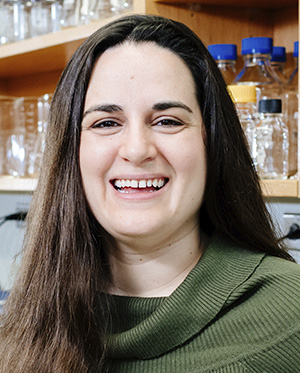 Summer Thyme, PhD
Summer Thyme, PhD
Assistant Professor of Biochemistry & Molecular Biotechnology
Office Location: LRB 803
Lab Location: LRB 870 R/S
Phone: 508-856-3251
xx
xx
Background
My long-term research goals are to uncover the molecular basis of complex neurodevelopmental diseases and eventually create therapies. I have a broad background in biochemistry, molecular biology, and neurobiology. To gain a fundamental understanding of protein structure and function and the skills to engineer therapeutics, I joined David Baker’s protein modeling lab for my graduate studies (2006-2012). I fused computational and experimental approaches to redesign biomolecular interactions, mastering a wide range of techniques including enzymology, directed protein evolution, multiple coding languages, and high-throughput computing. During my training I was funded by NSF graduate research fellowship, and my graduate work was recognized by receipt of the Harold M. Weintraub award.
As a Damon Runyon Postdoctoral Research Fellow and K99 recipient in Dr. Alexander Schier’s lab (2012-2019), I established expertise with zebrafish and laid the groundwork for my proposed research on the pathways regulated by genes associated with psychiatric disorders. Zebrafish is an ideal model vertebrate for large-scale genetic and neurodevelopmental studies. I generated over a hundred zebrafish mutants for schizophrenia-associated genes and assessed their brain activity, brain structure, and behavior. In preparing for this screen, I optimized the efficiency of Cas9-mediated mutagenesis in zebrafish, uncovered rules for Cas9 gRNA design, and made an unexpected discovery about embryonic DNA repair. From the study of over a hundred mutants, I uncovered shared phenotypes and phenotypes that relate to patient physiology, including altered forebrain development and decreased prepulse inhibition. These findings highlighted the most likely candidates in multi-gene loci and prioritized genes for further study. This screen provided the foundation for my independent lab, where I will decipher the detailed molecular and developmental functions of the most interesting candidates.
Mentoring Statement
Maintaining a healthy environment for all lab members is a top priority to me. A scientific career can be extremely stressful, and is much more so for those with additional challenges. In my lab, I will promote a culture of reasonable work-life balance, to ensure that lab members with diverse external pressures can flourish scientifically. For example, I will not schedule mandatory meetings after 4 pm so as to minimize scheduling conflicts for lab members with children in daycare. Please let me know if there is anything you would like to change about the way the lab is run, and I will take your input into consideration. A second aspect to a healthy lab is ensuring that all members realize that their contributions are highly valued and feel comfortable engaging in scientific exchange, regardless of their background and experience. When mentoring undergraduate students during my postdoc and graduate work, I would regularly encourage them to present their work to the larger lab group and to participate in external symposia where they present posters or give short lectures. Over the past twelve years I have been a main supervisor for three technicians and eight undergraduates, guiding them to co- and even first- authorships, and a secondary supervisor to several graduate students. As a professor, one of my roles is to be proactive in increasing awareness of all available resources, as some students may not know to inquire about them, as well as advocating for resources if they do not exist. I will particularly direct opportunities for collaborations and attending conference to lab members who may be less aware of how to advocate for their careers. My lab will establish and maintain a culture of support, awareness, and positive communication.
I expect all lab members to collaborate and share their expertise with each other, keep the lab organized, and generally be responsible citizens. There are always tedious tasks that need to be done to keep the lab running, and we will all share these duties. I will not monitor the hours you spend physically in the lab, but instead on the progress you are able to make on your project. Science is riddled with failure, and learning to troubleshoot and overcome setbacks is key to progress and maintaining your sanity. Please always think through the steps of an experiment yourself. Remember that I do not have all the answers, and could at some point give you incorrect information. However, I will try my best to steer you in the right direction, and I will support your career and decisions. I want you to feel comfortable communicating with me about any issues that arise during your time in my lab, and I will assist you in whatever you way is most helpful to you.
The “five questions” of my postdoc lab (credit: Alex Schier):
- Do you work on an important problem?
- Do you work with sustained concentration?
- Do you have a sense of urgency?
- Are you able to troubleshoot?
- Do you have the killer instinct to do the key experiments that will result in a coherent, conclusive and publishable study?
Other questions to think about throughout the year (from Schier lab yearly review):
- Is this really the most important, exciting, original and creative avenue to pursue or should you focus on something else?
- Are you sufficiently focused or do you do too much, or too little?
- Looking back, how completely were your expectations for the past year fulfilled?
- Looking forward, how realistic are your plans for the coming year?
- What data do you need to turn your project into a paper?
- Where do you want to be in 1, 2, 5, or 10 years?
- How do you get there?
